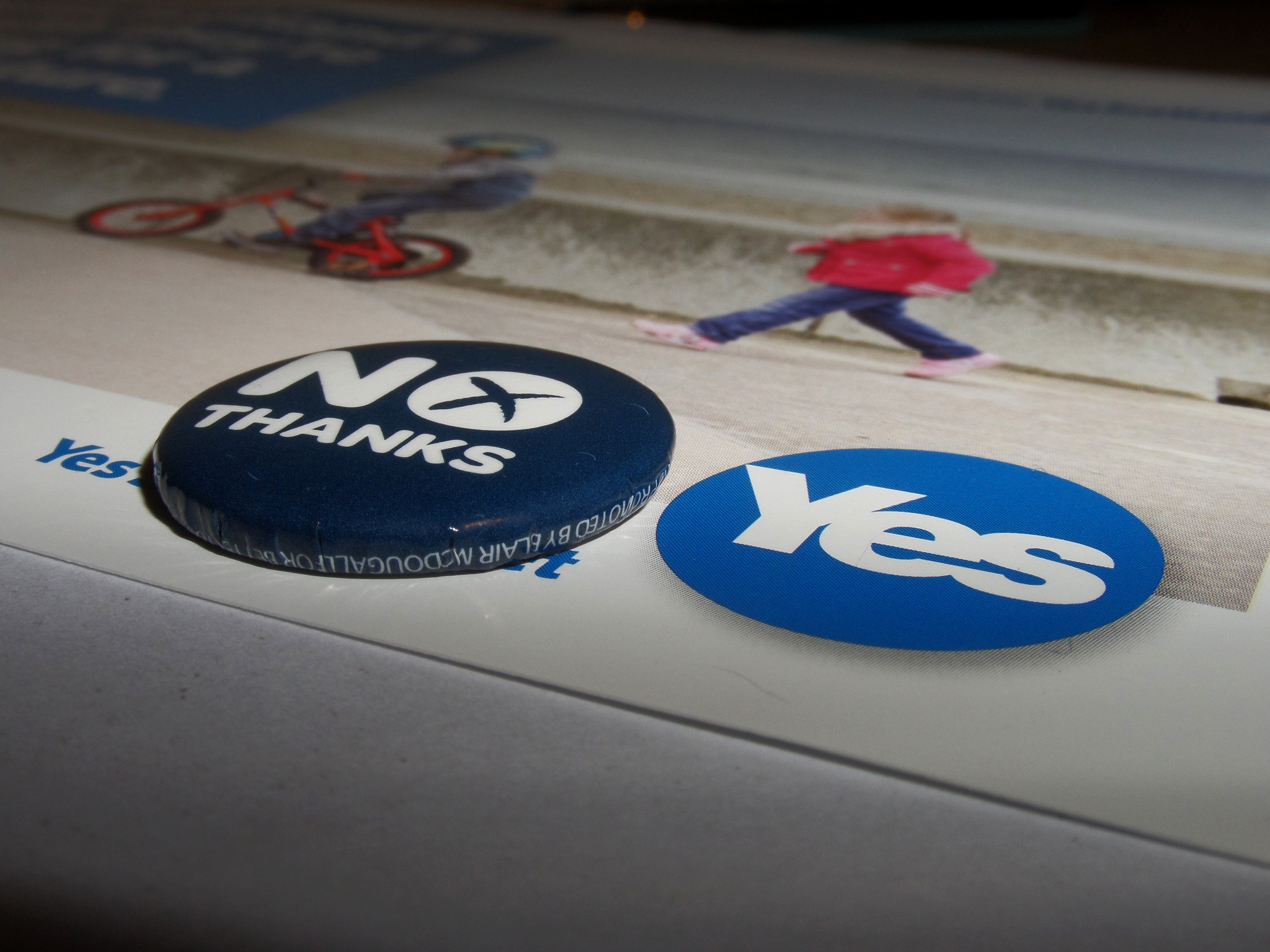The month leading up to the Scottish referendum was fraught with anxiety for those who wished to keep the United Kingdom whole. Fear over the campaign for independence succeeding in its goal, is likely the reason that, two days before the referendum, the leaders of the three biggest political parties in England signed a vow to grant Scotland more powers if the nation voted to remain in the U.K. The vow said that “extensive new powers” would be given to Scotland if they chose to remain in the union, though what details on which specific powers would were vague. “People want to see change,” reads the end of the vow. “A ‘No’ vote will deliver faster, safer, and better change than separation.”[1] This vow may have helped to keep Scotland in the U.K., with the final result of the vote showing a 10% difference between the two options, with 55% of the Scottish nation voting “no” to independence and 45% voting “yes.”[2] But if the promises by the current government to grant greater power to Scotland were successful in keeping the U.K. in one piece, it is now time to see how well the government delivers on its promises. There are already substantial differences in how England’s three main parties wish to change the policies in place in Scotland.
Scotland expects change to be forthcoming, and many voters that chose to remain in the U.K. likely did so partly because they believed that there would be increasing devolution in powers for Scotland. Devolution is the process of delegating powers to a lower level, and many Scots expect to be granted powers over their nation that, until now, have been under the control of the U.K. as a whole. During parliamentary debates on October 14th, Nicola Sturgeon, the Deputy First Minister of Scotland, said the following about Scottish desire for increased powers: “Many people who voted ‘No’ did so because they believed these vows would be honored. Polling since the referendum has shown that most people in Scotland want the Scottish parliament to have control over welfare, pensions and taxation and two thirds want devo max – that is, control in Scotland of everything except defence and foreign affairs.”[3]
One policy change that Scotland is hoping for is devolution of their tax structure. How much power the British government is willing to give up remains unclear, but some devolution of tax powers would have significant effects for Scotland. “Increased devolution will probably have similar outcomes as independence in the area of tax,” predicted a partner in the Withers law firm.[4] Part of the desire for increased tax power comes from resentment that Scottish taxes have been used to pay for Britain’s nuclear weapons program. “Bairns not bombs” was a popular slogan in the independence campaign, suggesting that an independent Scotland would be able to use its taxes to fund child care instead of nukes.[5] Alex Salmond, a leader of the Scottish National Party, outlined a plan last year for increased national childcare and education, which he claimed an independent Scotland could pay for by not funding nuclear weapons. He claimed it was a choice between “weapons of mass destruction and educating our children.”[6]
With regards to devolution of income taxes, two of the three major U.K. political parties have rather similar ideas. Both the Liberal Democrats and the Conservatives agree that essentially all income tax power should be granted to Scotland. The only power they want to reserve for London is the ability to set the “personal allowance,” which is the amount of income a person can earn before they must begin to pay taxes.[7] The Labour party, generally considered center-left, has taken a more conservative approach. They are willing to allow Scotland to control, at most, about two-thirds of the income tax, and to be prohibited from cutting the tax rate below the UK rate.[8] This plan is in contrast to the near complete control over income taxes the other two parties have proposed.
The Liberal Democrats want to grant Scotland the ability to set the rates of capital gains tax, inheritance tax, and air passenger duties. They are certainly the most progressive party in this respect. The Conservative Party is only willing to give up control of air passenger duties, and the Labour Party is not even willing to give up that. None of the parties seem inclined to give up control of corporation taxes.[9] Here, the Conservatives and the Labour party are similar, because both want to maintain most major taxing rights — other than income tax. The Liberal Democrats remain the most progressive and are willing to grant Scotland the rights to set nearly all taxes.
Another policy implementation that is vitally important to Scots is the ability of the nation to retain elements of a strong welfare state. There is a role reversal in the position of England’s political parties in granting tax power — versus granting power over social benefits — to Scotland. While the Labour party advocated the most conservative approach in giving away tax rights, it seems that they are the most willing to part with power over social welfare benefits. The Labour party and the Conservative party have both proposed to grant Scotland control over housing benefits and attendance allowance. Control over housing benefits would enable Scotland to get rid of a controversial “bedroom tax,” which gives penalties to those who live with spare bedrooms in housing associations. Control over attendance allowance means controlling benefits given to disabled people over the age of 65. The Liberal Democrats, however, wished for both these programs to remain in control of the London government.[10]
Another devolution issue concerns the maintenance of the National Health Service (NHS). Scotland is concerned that England is increasing privatization in the NHS. Recently, an increased number of contracts have been given to private health providers to deliver services. Scotland also worries about its own ability to fund the NHS. Currently, the funding of NHS is dependent on a lump sum of money that the current British government gives to Scotland to fund all public services. A convention, known as the Barnett formula, automatically changes the amount of U.K. NHS funding given to Scotland based on the Scottish population. However, all the money comes from the U.K. treasury, which has the power to change this formula at any time. Some leaders of the Scottish National Party have accused the U.K. of planning to change this formula. As a result, Scotland wishes to gain control over the provision of funding for the NHS in Scotland.[11] In the vow signed by the leaders of each major U.K. party, it was promised that “the final say on how much is spent on the NHS will be a matter for the Scottish Parliament.”[12] However, like many things in the aftermath of the referendum, how this policy will be implemented remains unclear. So far, the funding of the NHS still comes from the U.K. treasury, and there have been no measures taken to guarantee the continuation or alteration of the Barnett formula.
The policy positions of all U.K. political parties on these devolution issues remains unclear. As the Deputy First Minister stated, the majority of people in Scotland want increased control over taxes and welfare. The opinions of the parties inside England, however, are considerably more complex. The Labour Party, while so amenable to relinquishing control over social welfare, remains staunch in its desire to retain partial control over taxation. Part of this position stems from fears of cross-border tax competition.[13] The possible situation the Labour party is fearful of is one where people are motivated to live in the area where taxes are lowest. The Labour Party does not want the two nations competing over more attractive tax rates. This would be especially problematic with corporate taxes, as corporations would theoretically move to whichever part of the U.K. has the lowest rates. The potential for corporate tax competition is likely one reason why no party seems ready to give Scotland control over corporate tax rates. The Labour Party has also claimed that giving up tax power to Scotland would increase interest rates, which could mean the Treasury of the U.K. would lose much of its ability to raise money. Some in the Labour Party believe this would increase the risk of debt defaults, thereby motivating banks to charge higher interest rates to make up for the lack of revenue and protect themselves against these supposed defaults. Whatever the motivations of the Labour party, their resistance to giving up tax control stands in the way of the tax devolution that Scotland wants.[14]
In contrast to the Labour Party position on taxes, the Liberal Democrats hesitate to relinquish welfare control, largely due to the worry that the benefits they value will no longer be applied in Scotland. They want those receiving housing benefits in Scotland, for example, to continue to have the same protections and benefits as those in the rest of the U.K. This party hesitates, it seems, because they want to be sure that Scottish citizens will continue to receive the same social benefits as do the citizens of the U.K.[15]
Another possible hesitation for politicians in granting new powers to Scotland is the fear of citizens within England itself calling for more localized devolution as a result. Scotland has a population of 5 million people, relatively small compared to England’s 53 million. If Scotland receives control over issues such as taxation and welfare, independent areas within England may also call for increased rights in these areas.[16] Some politicians are already calling for increased decentralization within England itself.[17] Politicians such as Nick Clegg see the increased decentralization in Scotland as an opportunity to impose a more federal structure on the U.K. “When we deliver the promises that we made in the course of that devolution referendum,” said Clegg, “then we will unlock the promise to federalism across the whole of the U.K.”[18] It appears that the end result of Scottish devolution could contribute to an entirely new political structure throughout the U.K.
While the British government seems divided over how much power to grant to Scotland, there appears to be commitment to change. London is sticking to a timetable set up before the referendum for possible devolution changes to occur in the near future. The timetable includes work to begin on new legislation the day after the referendum: a “command paper” to be published by the U.K. government setting out all proposals by the end of October, a “white paper” to be drawn up by the end of November after consultation on setting out proposed powers, and a draft of a new Scotland Act to come in January.[19] This new Scotland Act will be the document that grants new powers to Scotland. This commitment to change will be necessary to maintain Scottish contentment, because the Scottish people have been calling for massive change. 45% of Scots were ready to leave the U.K. for this change, and of the 55% that voted to stay, many only did so because they believed Scotland would be granted more independence and powers of self-rule. Alex Salmond, the Scottish National Party Leader, went so far as to make a statement that seemed to imply Scotland will pursue a new referendum if the promises made for new Scottish powers are not met: “Let the message be very clear from this hall and from this country … Prime Minister – delay, prevaricate, block or obstruct the implementation of what Scotland was promised, and Scotland will take matters into our own, democratic, hands.”[20]
If the massive changes promised by government officials don’t come to fruition, the British government could have a real problem with discontentment among the Scots. Of course, government officials feel compelled to find a balance between too much freedom and too little freedom for Scotland. While too little is likely to earn serious backlash from Scotland, too much could change the face of the U.K. completely, something many government officials are not comfortable with. If Wales and Northern Ireland see a precedent for increased autonomy while remaining under the protective wing of the U.K., who’s to say what new demands they may levy on the English government? As some politicians are fighting against what they see as deterioration of the Union, others seem to be supporting further division of powers. The fight over the referendum may be over, but the fight for devolution in Scotland is just beginning, and it seems that the whole of the U.K. may change in the process.
Reference
[1] Dearden, Lizzie. “Cameron, Miliband and Clegg Sign Devolution ‘vow’ but Scots Sceptical.” The Independent. Independent Digital News and Media, 16 Sept. 2014. Web. 26 Oct. 2014.
[2] “Scotland Votes ‘No’ to Independence.” BBC News. BBC, 19 Sept. 2014. Web. 26 Oct. 2014.
[3] Sparrow, Andrew. “MPs Debate Further Devolution after the Scottish Referendum.” The Guardian. The Guardian, 14 Oct. 2014. Web. 25 Oct. 2014.
[4] Palin, Adam. “Scottish Tax Powers Afoot despite ‘No’.” Financial Times. Financial Times, 19 Sept. 2014. Web. 26 Oct. 2014.
[5] Scotland’s Future.” Scottish Government. The Scottish Government, Nov. 2013. Web. 16 Nov. 2014.
[6] “Salmond Outlines Childcare ‘savings'” BBC News. BBC, 27 Nov. 2014. Web. 23 Nov. 2014.
[7] Cook, James. “What Now for ‘the Vow’?” BBC News. BBC, 1 Oct. 2014. Web. 26 Oct. 2014.
[8] Carrell, Severin. “Lib Dems Press Labour over Scottish Income Tax Powers.” The Guardian. The Guardian, 5 Oct. 2014. Web. 16 Oct. 2014.
[9] Cook, James. “What Now for ‘the Vow’?” BBC News. BBC, 1 Oct. 2014. Web. 26 Oct. 2014.
[10] Milligan, Brian. “‘No’ Vote to Alter Tax and Benefits.” BBC News. BBC, 19 Sept. 2014. Web. 25 Oct. 2014
[11] Bajekal, Naina. “Scotland’s Health Care System Becomes a Key Referendum issue.” Time. Time, 17 Sept. 2014. Web. 25 Oct. 2014.
[12] Dearden, Lizzie. “Cameron, Miliband and Clegg Sign Devolution ‘vow’ but Scots Sceptical.” The Independent. Independent Digital News and Media, 16 Sept. 2014. Web. 26 Oct. 2014.
[13] Carrell, Severin. “Lib Dems Press Labour over Scottish Income Tax Powers.” The Guardian. The Guardian, 5 Oct. 2014. Web. 16 Oct. 2014.
[14] Johnson, Simon, and Steven Swinford. “Gordon Brown Warns Tory ‘lethal Cocktail’ Could End Union.” Telegraph. The Telegraph, 13 Oct. 2014. Web. 16 Nov. 2014.
[15] Carrell, Severin. “Lib Dems Press Labour over Scottish Income Tax Powers.” The Guardian. The Guardian, 5 Oct. 2014. Web. 16 Oct. 2014.
[16] “After the No Vote.” The Economist. The Economist Newspaper, 19 Sept. 2014. Web. 18 Nov. 2014.
[17] Wintour, Patrick, and Rowena Mason. “Nick Clegg: The ‘cat Is out of the Bag’ on More UK Devolution.” The Guardian. The Guardian, 11 Sept. 2014. Web. 16 Nov. 2014.
[18] “Nick Clegg Tells Lib Dem Conference: Scottish Devolution Will Unlock Federalism across the UK.” BelfastTelegraph.co.uk. Belfast Telegraph, 08 Oct. 2014. Web. 16 Nov. 2014.
[19] “Brown Sets out More Powers Timetable.” BBC News. BBC, 8 Sept. 2014. Web. 26 Oct. 2014.
[20] Smout, Alistair, and Guy Faulconbridge. “Scotland May Seek New Independence Vote If UK Delays Devolution, Salmond Says.” Reuters. Thomson Reuters, 14 Nov. 2014. Web. 16 Nov. 2014.



